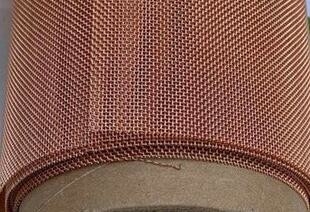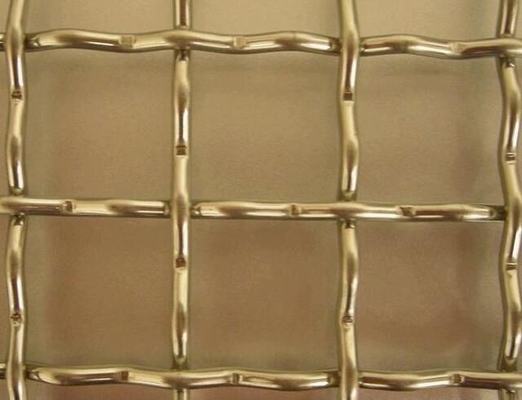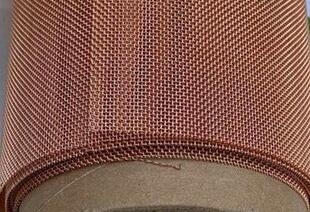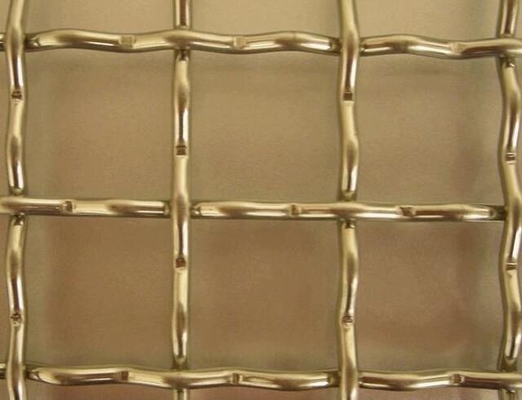-
SS Welded Wire Mesh
-
SS Woven Wire Mesh
-
Stainless Steel Dutch Wire Mesh
-
Stainless Steel Crimped Wire Mesh
-
Stainless Steel Knitted Wire Mesh
-
Stainless Steel Security Screen Mesh
-
Stainless Steel Wire Coil
-
Metal Woven Wire Mesh
-
Expanded Metal Mesh
-
Perforated Metal Mesh
-
Wire Mesh Filters
-
Wire Conveyor Belt
-
Decorative Metal Mesh
-
Sintered Wire Mesh
-
Metal Wire Mesh Fence
-
 JoelThank you, thank you again for your excellent customer service.
JoelThank you, thank you again for your excellent customer service.
Brass Wire Mesh Used In EMI / RFI Shielding With Resistant To Saltwater And Oxidation
| Features | Abrasion, Corrosion, High Temperature And Spark Resistance. | Product Name | Brass Wire Cloth |
|---|---|---|---|
| Material | Brass Wire | Brass Material | 65% Copper / 35% Zinc, 70% Copper / 30% Zinc |
| Hole Shape | Square | Weaving Type | Plain Weave, Twill Weave |
| Mesh Counts | 6 To 200 Per Inch | Width | 0.5 To 3m |
| Length | 30m | Application | Filters Or Decorative, Particle Filtration, Acoustic Panels |
| Highlight | Resistant To Saltwater Brass Wire Mesh,Oxidation Resistant Brass Wire Mesh,EMI/RFI Shielding Brass Wire Mesh |
||
Brass Wire Mesh used in EMI/RFI shielding with Resistant To Saltwater And Oxidation
Brass Wire Mesh/ Brass Wire Cloth
Brass wire mesh is made from brass, an alloy of copper (Cu) and zinc (Zn), typically in ratios like 70/30 or 80/20. The zinc content enhances strength and corrosion resistance while retaining malleability. Manufacturing involves drawing brass into wires, followed by weaving (plain, twill, or Dutch weave) or welding. Annealing may be used to soften the material for intricate weaves.
Brass wire mesh excels in applications requiring corrosion resistance, aesthetics, antimicrobial properties, or non-sparking safety. While costlier than aluminum or steel, its unique benefits make it indispensable in marine, decorative, medical, and hazardous environments. Proper selection of alloy, weave, and surface treatment ensures longevity and performance.
Our main specifications
| Mesh | Wire Dia. | Opening(mm) | ||
| SWG | mm | inch | ||
| 6 | 22 | 0.711 | 0.028 | 3.522 |
| 8 | 23 | 0.61 | 0.024 | 2.565 |
| 10 | 25 | 0.508 | 0.02 | 2.032 |
| 12 | 26 | 0.457 | 0.018 | 1.66 |
| 14 | 27 | 0.417 | 0.016 | 1.397 |
| 16 | 29 | 0.345 | 0.014 | 1.243 |
| 18 | 30 | 0.315 | 0.012 | 1.096 |
| 20 | 30 | 0.315 | 0.0124 | 0.955 |
| 22 | 30 | 0.315 | 0.0124 | 0.84 |
| 24 | 30 | 0.315 | 0.0124 | 0.743 |
| 26 | 31 | 0.295 | 0.0116 | 0.682 |
| 28 | 31 | 0.295 | 0.0116 | 0.612 |
| 30 | 32 | 0.247 | 0.011 | 0.573 |
| 32 | 33 | 0.254 | 0.01 | 0.54 |
| 34 | 34 | 0.234 | 0.0092 | 0.513 |
| 36 | 34 | 0.234 | 0.0092 | 0.472 |
| 38 | 35 | 0.213 | 0.0084 | 0.455 |
| 40 | 36 | 0.193 | 0.0076 | 0.442 |
| 42 | 36 | 0.193 | 0.0076 | 0.412 |
| 44 | 37 | 0.173 | 0.0068 | 0.404 |
| 46 | 37 | 0.173 | 0.0068 | 0.379 |
| 48 | 37 | 0.173 | 0.0068 | 0.356 |
| 50 | 37 | 0.173 | 0.0068 | 0.335 |
| 60×50 | 36 | 0.193 | 0.0076 | - |
| 60×50 | 37 | 0.173 | 0.0068 | - |
| 60 | 37 | 0.173 | 0.0068 | 0.25 |
| 70 | 39 | 0.132 | 0.0052 | 0.231 |
| 80 | 40 | 0.122 | 0.0048 | 0.196 |
| 90 | 41 | 0.112 | 0.0044 | 0.17 |
| 100 | 42 | 0.012 | 0.004 | 0.152 |
| 120×108 | 43 | 0.091 | 0.0036 | - |
| 120 | 44 | 0.081 | 0.0032 | 0.131 |
| 140 | 46 | 0.061 | 0.0024 | 0.12 |
| 150 | 46 | 0.061 | 0.0024 | 0.108 |
| 160 | 46 | 0.061 | 0.0024 | 0.098 |
| 180 | 47 | 0.051 | 0.002 | 0.09 |
| 200 | 47 | 0.051 | 0.002 | 0.076 |
Other specifications according to your requirements.
Features of brass wire mesh(cloth):
Corrosion Resistance: Excellent in marine and humid environments; resistant to saltwater and oxidation.
Antimicrobial: Naturally inhibits bacterial growth, ideal for sanitary applications.
Conductivity: Good electrical and thermal conductivity (lower than pure copper but higher than many alloys).
Aesthetic Appeal: Gold-like luster, often used decoratively; develops a patina over time.
Malleability/Ductility: Easily shaped without cracking.
Non-Sparking: Safe for flammable or explosive environments.
Weight: Heavier than aluminum but lighter than steel.
Types and Variations:
Weave Patterns: Plain (standard), twill (dense), Dutch (fine filtration).
Mesh Specifications: Wire diameter (18–40 gauge), mesh count (2–200 openings per inch).
Alloys: 70/30 (high corrosion resistance) vs. 80/20 (better formability).
Surface Treatments: Lacquering or nickel plating to prevent tarnishing.
Application of brass wire mesh(cloth):
Decorative: Architectural grilles, lighting fixtures, and art installations.
Filtration: Air, liquid, and fuel filters in oil/gas industries (non-sparking).
Medical/Sanitary: Antimicrobial screens for HVAC systems or healthcare equipment.
Marine: Corrosion-resistant components for boats and coastal structures.
Electrical: Shielding, grounding meshes, and electronic components.
Food Processing: Non-reactive sieves and screens.
Jewelry: Crafting and texturing.
Decorative wall panels in luxury interiors.
Spark-proof filters in chemical plants.
Antique-style lamp shades.
Insect screens in coastal homes.
Crafting handmade jewelry.
Packing:
Brass wire mesh is packed in rolls,winding on a paper tube,wrapped in moisture-proof paper or plastic film, outside wooden cases or wooden pallet.
![]()
Please look at following drawing, we need material, wire diameter(D), opening(L), width x length and quantity to offer an exact quote.
![]()






